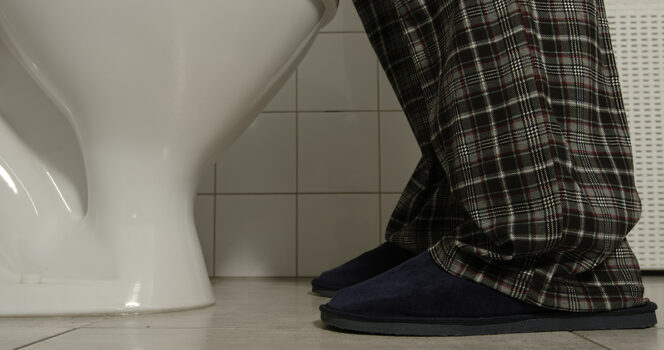Frequent nighttime trips to the toilet – known as nocturia – can be more than just a sign of drinking too much water before bed. Recent research suggests these annoying wake-ups might be linked to high blood pressure and even heart failure.
Ideally, we should get six to eight hours of uninterrupted sleep every night. But if you’re waking up often to pee, it’s disrupting your sleep cycle, resulting in daytime fatigue, cognitive impairment, mood alterations, increased susceptibility to disease, and so much more.
Nocturia, a condition that causes you to wake up during the night to pee, is often described as the most bothersome of all urinary symptoms.
It’s also one of the most common disorders that affects 50 million across the U.S., according to the Cleveland Clinic.
“Nocturia is a common condition affecting more than 50% of adults after age 50. It’s more common in males after age 50. Before 50, nocturia is more common in females,” the clinic writes.
Possible causes
There are several reasons why you might be getting up to use the bathroom at night, including:
• High fluid intake before bed
• Alcohol or caffeine consumption in the evening
• A small bladder
• High blood pressure
• Diabetes (Type 1 or Type 2)
• Pregnancy
• Water retention (fluid buildup in the body)
• Sleep apnea
• Benign prostatic hyperplasia (BPH) in men
• Certain medications (such as diuretics, lithium, and excessive vitamin D)
If nocturia is a regular issue, it’s worth investigating what’s really causing it.
In fact, recent research reveals a disturbing connection between heart failure and an overactive bladder.
Nocturia and your heart
At first, it might not seem like your heart and your bladder have much in common, but the body is an interconnected system, and researchers warn the two are closely linked.
“Our study indicates that if you need to urinate in the night – called nocturia – you may have elevated blood pressure and/or excess fluid in your body,” said study author Dr Satoshi Konno, of the Division of Hypertension, Tohoku Rosai Hospital, Sendai, Japan.
“We found that getting up in the night to urinate was linked to a 40% greater chance of having hypertension…And the more visits to the toilet, the greater the risk of hypertension.”
The study shows that 69% of people had nocturia and the results “do not prove a causal relationship between nocturia and hypertension,” the doctor said.
He clarified that the findings may not apply to populations outside Japan, where more than 33 million adults – about 45% of adults – were estimated to have hypertension.
“The relationship may be influenced by various factors including lifestyle, salt intake, ethnicity, and genetic background.”
When should you be concerned?
If you’re waking up once in a while to pee, it’s probably not a big deal.
But if it’s happening multiple times a night, it could be a sign of an underlying health issue, according to the Cleveland Clinic.
Here are some signs to watch for:
• Frequent nighttime urination (two or more times per night).
• Swelling in your legs or feet (a sign of fluid retention).
• Shortness of breath, especially when lying down.
• Fatigue or dizziness during the day (sleep cycle disruption).
If these symptoms sound familiar, it might be time to check in with your doctor.
What you can do
Managing high blood pressure can help reduce nocturia.
Here’s what you can do:
• Monitor your blood pressure – If you’re not already checking it regularly, now’s a great time to start. High blood pressure often has no obvious symptoms, so keeping an eye on it is crucial.
• Cut back on salt and caffeine – Too much sodium can cause fluid retention, while caffeine acts as a diuretic, making you urinate more.
• Stay active – Exercise can help improve circulation, reduce fluid build-up, and keep your heart healthy.
• Limit fluids before bed – While hydration is essential, cutting back on drinks in the evening (especially alcohol and caffeine) might help.
• Get a check-up – If frequent urination at night is disrupting your sleep, a doctor can help determine if high blood pressure or another health issue is the culprit.
While waking up to pee every now and then is normal, frequent nighttime urination could be a sign of high blood pressure or heart issues. If you find yourself making multiple trips to the bathroom each night, it’s worth checking in with a doctor. Addressing the underlying cause could improve your sleep – and potentially save your life.
Please share this story so others will also be aware of this shocking link between frequent overnight potty breaks and hypertension!




